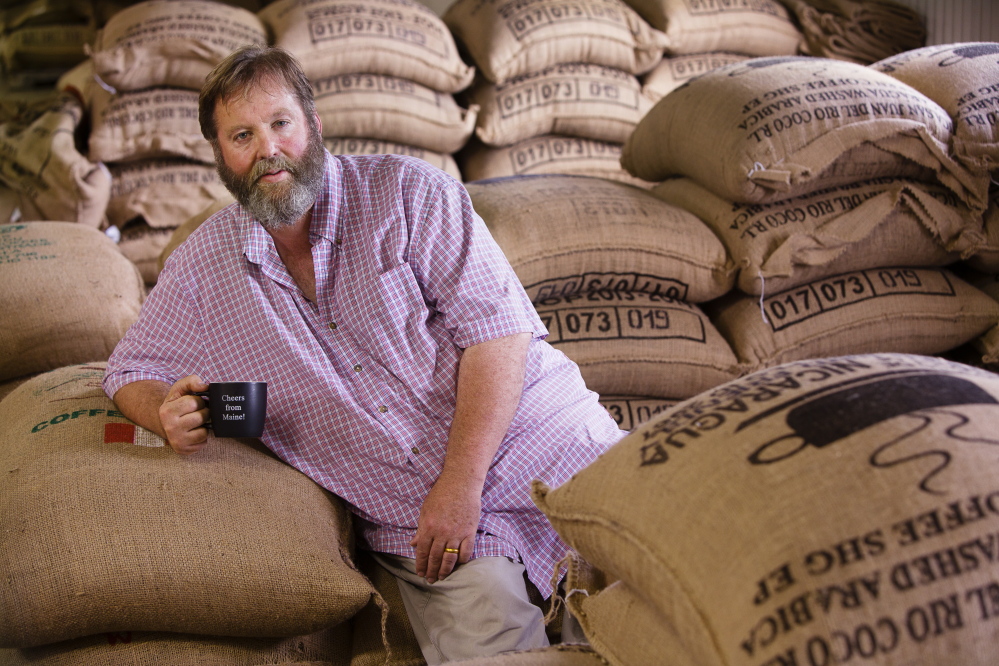Bob Garver, the founder and owner of Topsham-based Wicked Joe Coffee, has visited an estimated 1,000 coffee farms in his day. Obviously, all of them are far away – whether in Mexico or Peru or El Salvador – and those coffee beans must travel many miles to be roasted in Maine.
His answer to the issue of sustainablity, which matters deeply to him, is to employ “best practices” (he doesn’t like the term either) in a big way. As we learned when we called him to ask questions such as, “What is bird-friendly coffee?” the roastery he and his wife, Carmen, run is jammed with features designed to make a greener cup of joe.
RESUME: The Garvers got into the coffee-roasting business in 1992 in Santa Cruz, California. Carmen is from Connecticut; Bob is from New York’s Hudson Valley. Both visited Maine as children and “thought it was the best place in the world.” Sometimes it seemed as though half the books they were reading aloud to their three small daughters in Santa Cruz were set in Maine – “Miss Rumphius” and the like. “We were going to be the crazy California cousins that nobody knew,” Garver said. But then their vision of themselves changed. Why not make sure their kids grew up with snow days as they had? Why not move to Maine? In 2003, they made the leap. “Santa Cruz is awesome, but so are four seasons,” Garver said.
GREEN BEANS: In Santa Cruz, sustainability already had been part of the Garvers’ mission, so Bob was used to seeking out coffee that was organically grown or Fair Trade (his best practices extending to economic and social justice for the growers). They’ve been working to increase the percentages of both organic and Fair Trade beans in their Maine company, and as of July 1, 100 percent of their beans are either organic, Fair Trade or both.
MACHINE MATTERS: Garver made the switch to a seriously expensive coffee roasting machine recently, the Loring Smart Roaster. The marketing for these machines included some sustainability-related promises that they’d use about 80 percent less fossil fuel and put out 80 percent fewer emissions, Garver said. “We believe it is a best practice to be as sustainable as we can be,” he said. So far, the machine has been delivering on the sales job, he said.
TRAVEL TIME: He and Carmen do a lot of traveling, taking four or five trips a year to check in on suppliers. “It’s very important for us to be connected,” he said. “That is what feels most authentic to us.” They check packaging and make sure that farmers are telling the truth about growing conditions. For example, coffee sold as “shade grown” could be merely grown on a farm where there is a canopy of trees, but the beans might not be grown under it. To receive what Garver says is the “gold standard” of sustainability, the bird-friendly certification from the Smithsonian Migratory Bird Center, coffee must be grown under a three-layer level of canopy composed of a dozen or so varieties of trees.
FOR THE BIRDS: And yes, they bring their binoculars. They’ve run into some “rock star bird people” along the way, including that time in Nicaragua they met up with a couple of real experts, Kenn Kaufman, the author of the “Kaufman Field Guide to Birds of North America,” which Garver happened to be carrying, and Kaufman’s wife, Kim. “We were there to verify the coffee quality, and they were there to count birds,” Garver said. The Garvers tagged along. “I could go on for days,” he said excitedly.
BACK HOME: Wicked Joe moved from Brunswick to the old Navy base commissary in Topsham in 2013, which gave Garver a chance to bring energy efficiency to the business in a big way.
They insulated the building with foam, added skylights to supply natural light, put a photovoltaic solar array on the roof to power the electricity and a solar wall to offset heating costs (their system runs on natural gas).
Their vans, used for coffee delivery, including to Bard in Portland (which the couple also owns), are all electric. Even their forklift is electric.
PLUGGED IN: They have a charging station for those electric vehicles, which they make available to any member of the public with a need to plug in their car. It’s powered by the solar installation. “So my electric cars run on solar, at least some of the time.” Because the sun doesn’t always shine. Which brings us back to his three daughters, now in high school and middle school. They are presumably past the age of reading “Miss Rumphius.” But they definitely have enjoyed some snow days. While their parents drink coffee.
Send questions/comments to the editors.



